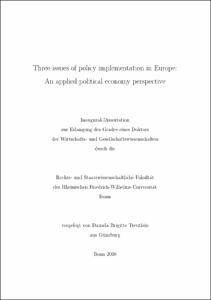Three issues of policy implementation in EuropeAn applied political economy perspective

An applied political economy perspective

| dc.contributor.advisor | von Hagen, Jürgen | |
| dc.contributor.author | Treutlein, Daniela Brigitte | |
| dc.date.accessioned | 2020-04-11T18:49:20Z | |
| dc.date.available | 2020-04-11T18:49:20Z | |
| dc.date.issued | 2008 | |
| dc.identifier.uri | https://hdl.handle.net/20.500.11811/3317 | |
| dc.description.abstract | This thesis aims to shed light on the political-economic factors explaining the policy outcomes of the following three European political issues: | en |
| dc.language.iso | eng | |
| dc.rights | In Copyright | |
| dc.rights.uri | http://rightsstatements.org/vocab/InC/1.0/ | |
| dc.subject | EU-Richtlinien | |
| dc.subject | Transposition | |
| dc.subject | Implementation | |
| dc.subject | Stichproben-Selektion | |
| dc.subject | GLM | |
| dc.subject | gemischte Modelle | |
| dc.subject | EU directives | |
| dc.subject | sample selection | |
| dc.subject | mixed model | |
| dc.subject.ddc | 330 Wirtschaft | |
| dc.title | Three issues of policy implementation in Europe | |
| dc.title.alternative | An applied political economy perspective | |
| dc.type | Dissertation oder Habilitation | |
| dc.publisher.name | Universitäts- und Landesbibliothek Bonn | |
| dc.publisher.location | Bonn | |
| dc.rights.accessRights | openAccess | |
| dc.identifier.urn | https://nbn-resolving.org/urn:nbn:de:hbz:5-14237 | |
| ulbbn.pubtype | Erstveröffentlichung | |
| ulbbnediss.affiliation.name | Rheinische Friedrich-Wilhelms-Universität Bonn | |
| ulbbnediss.affiliation.location | Bonn | |
| ulbbnediss.thesis.level | Dissertation | |
| ulbbnediss.dissID | 1423 | |
| ulbbnediss.date.accepted | 19.05.2008 | |
| ulbbnediss.fakultaet | Rechts- und Staatswissenschaftliche Fakultät | |
| dc.contributor.coReferee | König, Thomas |
Dateien zu dieser Ressource
Das Dokument erscheint in:
-
E-Dissertationen (288)




